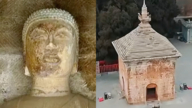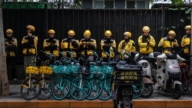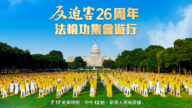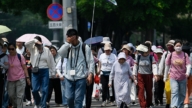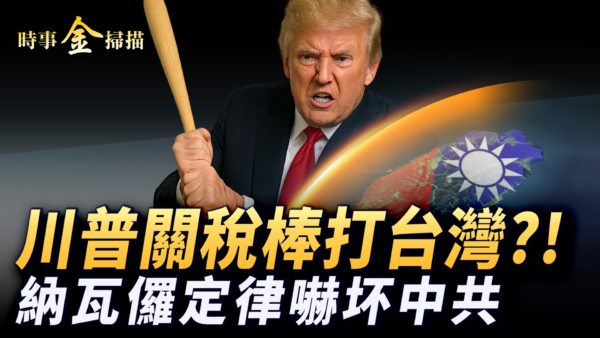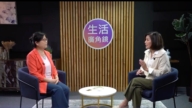【新唐人2013年01月25日讯】最近“房叔”、“房妹”、“房姐”等被媒体炒得火热,人们对他们深挖后发现,他们很多人是双户口甚至是多户口。这在户籍枷锁严重桎梏普通民众的中国,人们吃惊不小。学者指出,多户口给腐败行了方便,也有媒体指出,“多户口画皮”非扒不可。请看报导。
最近,陕西省神木县农商行原副行长龚爱爱,因为被爆出拥有超过10亿元的房产,名声“远扬”。北京《京华时报》证实,除了10亿房产,龚爱爱至少拥有四个户口,两个在陕西省神木县公安局人民路派出所,另两个分别在北京市朝阳区奥运村派出所,及陕西省神木县大柳塔派出所,名字也不全相同。
依据中国现行户籍法规,一个公民只能拥有一个户籍,身份证号也是唯一的、终身不变。山东《齐鲁晚报》指出,中国社会的很多行为准则,如婚姻、购房、社保、银行户头、护照,甚至选举权与被选举权等,都是建立在这个前提之下。一旦这个前提被蓄意破坏,那么,法律与伦理都将陷于尴尬的境地, 滋生出难以预料的恶果。因此,多户口“画皮”非扒不可。
曾任警察的网友张先生:“只要肯花钱,她可以申请无数个身份证,不同的名字,但是都是她本人的。理论上她就可以拥有无数套房子。所以就方便她把那个赃款、把她的那些不义之财可以转化,而且你是没办法查,因为你查龚爱爱只能查到三套,其他的那些房产你是根本查不到。都是方便这些贪官、方便这些不义之财去洗钱。”
深圳《晶报》认为,在当前的户籍管理制度下,与户籍挂钩的 权利有20多项,尤其在北京、上海等大城市,依附于户口的福利和便利更多。这些备受关注的“多户口”事件,本质都是腐败问题。
深圳当代社会观察研究所所长刘开明:“你没有户口,比如说你在北京买不到车、买不到房。他有不同的户口,就可以办不同的身份证,不同的护照。有需要的时候,官员很容易能拿到。比如说,陕西神木这个房姐不是什么重要的官员,但是她只要有关系、有钱,她也能拿到多个户口。”
身为“南京大学”文学博士的刘开明还表示,中国户口管理是非常严格的,但对有特权的人又非常混乱。
“中国人民公安大学”教授王太元指出,户籍管理经过电脑网路化后,能够平白无故增添一个户口,只能是一种情况:这些经办人、审批人被收买而营私舞弊、贪赃枉法。
曾任警察的网友张先生:“按照规定,你要办一个新身份证,要改名字,要改户口本,肯定要局长批。尤其是改名字,成年人改名字,绝对是要局长批的,一般的派出所都没有权力的。真查下去,那查得官多了,你说他能真查下去吗?”
张先生曾经是一名警察,他指出,公安部门作假情况非常严重,真查下去的话,可能整个公安局人员都得被抓。所以,最多是把那些办事的民警、临时工或编外人员抓出来,找几个替罪羊处理,就完了。
在贪官中,拥有多户口并非个案。
不久前,被爆料拥有29套房产的郑州“房妹”,全家都是双户口﹔而广州“最牛烟草局长”陈文铸、安徽省凤阳县公安局原局长陶勇等,也都拥有两个户口﹔另外,被称为“职级最低、数额最大、手段最恶劣的女贪官”,原辽宁省抚顺市顺城区国土资源局局长罗亚平,有12张身份证、15个户口本。
对于这些身份多样的贪官,用“狡兔三窟”来形容都太逊色。
人口研究学者刘忠良发现,对比中共国家统计局2010年发布的第六次人口普查报告,和第五次普查报告,在1951年至1995年期间出生的中国人,不仅一个没死,还多出了564万。
其中,有多少是贪官的双户口或多户口,无法得知!
采访/朱智善 编辑/宋风 后制/陈建铭
China’s Household Registration System Facilitates Corruption
The terms “House-Uncle” and “House-Sister” have
recently become the new hot topics in China’s media.
These phrases were newly invented by Chinese
netizens, as a way of identifying corrupt officials
of the Chinese Communist Party (CCP) regime.
Reportedly, many officials owned dual or multiple
Hukou (record of official household registration).
Tis has greatly shocked the ordinary Chinese people.
Commentators indicate that multiple home ownership
has facilitated these CCP officials to commit corruption.
Media commented that exposure
of multi-Hukou holders is a must.
Gong Aiai, former Vice President at Rural
Commercial Bank in Shenmu county, Shaanxi
Province, has recently become notorious.
It was disclosed that Gong owns
real estate worth over 1 Billion yuan.
The Beijing Times newspaper confirmed the news,
and added that Gong also holds at least four Hukou.
Three of these Hukou were registered in Shaanxi, and the
other was in Beijing, but all were under different names.
Under existing regulations, each Chinese citizen is
allowed to have only one Hukou, and one ID number.
The Qilu Evening News in Shandong commented that
the Hukou system confines many civil rights in China.
This includes marriage, house buying, social welfare
benefits, opening bank accounts, and application for
passports, as well as the right to elect and to be elected.
The article says that once the regulation is undermined,
it will be legally and ethically embarrassing.
It may even trigger unpredictably bad results.
Therefore, exposing multi-Hukou holders
is a must, according to the media reports.
Mr. Zhang, netizen and ex-police officer): “By buying
off people, one can apply for and get numerous ID cards.
These cards are therefore under different names.
Multi-Hukou facilitates buying many houses, money
laundering, which is also hard to be uncovered.
Probes will find only the three
houses registered under a name.
This is a way that facilitates money
laundering for those corrupt officials.”
Shenzhen-based Jingbao newspaper reviewed that
over 20 civil rights are bound into the Hukou system.
In particular, in large cities, such as Beijing and
Shanghai, where local Hukou entitles a person
to better social welfare benefits and conveniences.
The Jingbao article indicates that corruption
is the root of these multi-Hukou incidents.
Liu Kaiming, director of a civil think tank
in Shenzhen: “Without Hukou, such as in
Beijing, you are ineligible to buy cars and houses.
But with Hukou, one can get many ID cards and passports.
This is very easily done for those officials when they need.
In the case of ‘Shenmu house-sister’, who isn’t
an official, but has money and connections,
she was able to get several Hukou.”
Liu Kaiming adds that the CCP regime
implements a very strict Hukou system.
However, it allows privileged officials to behave unchecked.
Wang Taiyuan, a professor at the Chinese People’s
Public Security University, analyzed the issue.
He says that multi-Hukou can be easily created
through the online official Hukou management network.
Therefore, all that needs to be done is buying off the
person in charge, and those involved in the approval.
Mr. Zhang, netizen and ex-police officer: “The regulation
states that a local police chief can approve any new ID
card application, or a name change or Hukou alterations.
Especially for an adult who wants to changes his name, that
will definitely be able to be approved by a local police chief.
The head of the local police station has no authority on this.
If the case is investigated, I believe many police officials
can be pulled up, but can they make a real investigation?”
Mr. Zhang, a former police officer, says that forgery
is very rampant in the public security sector.
If the case is truly investigated, all staff in the public
security bureau who are involved may be arrested.
He speculates that the case would end in the arrest
of those civil police officers who handled the case,
or finding some temporary staff to bear the blame.
Corrupt CCP officials holding multi-Hukou
are very commonplace in China.
Lately, it was disclosed that a former chief of the local Real
Estate Administration in Zhengzhou city owns 29 houses.
Each family member held two Hukou.
Other dual-Hukou holders include Chen Wenzhu,
the former head of the State Tobacco Monopoly
Administration in Shanwei, and Tao Yong,
the former police chief of Fengyang in Anhui.
Another case is Luo Yaping, former chief of Land Resources
Administration of Shuncheng District, in Fushun, Liaoning.
Luo was reported to hold 12 ID cards
and 15 Hukou record booklets.
An old Chinese saying goes that a
“smart mouse has more than one exit hole.”
This seems to pale in comparison to CCP officials.
Demographer Chen Zhongliang’s latest discovery looked
at the research of population censor Liu Zhongliang.
The number of Chinese who were born between
1951 and1995 has been increased by 5.64 million.
This is in comparison to the fifth
and the sixth official census reports.
This raises a question of whether corrupt officials have
created false population data to buy additional houses.


